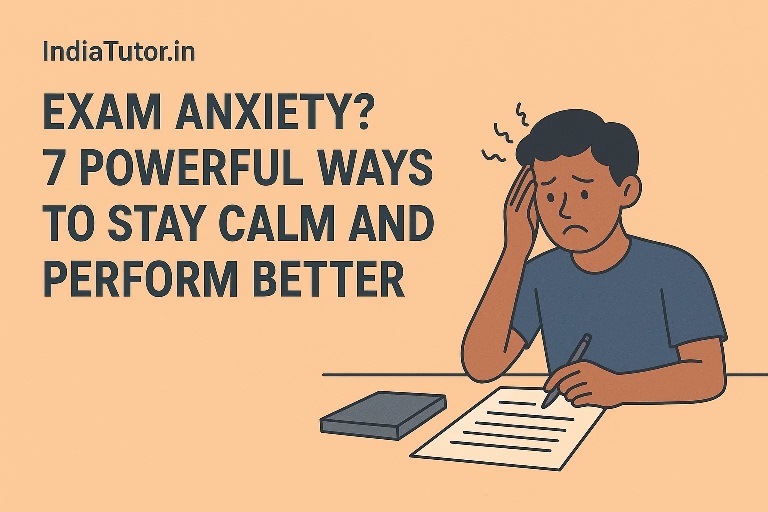Exams are a part of every student’s life. But for many, just hearing the word exam can cause stress, sleepless nights, and even physical discomfort. This fear of exams is real and very common—it’s called exam anxiety.
In India, a study by the National Sample Survey Office (NSSO) revealed that over 60% of students reported feeling pressure during exams. Some level of stress is normal, but when anxiety interferes with your ability to study or perform in the exam hall, it’s time to take action.
The good news? You can manage exam anxiety and even turn it into a positive force. Here are 7 simple and powerful ways to stay calm and perform your best.
1. Understand What Exam Anxiety Really Is
Exam anxiety is a type of performance anxiety. It can make your heart race, your palms sweat, or even cause headaches and stomach aches. Some students may blank out during the exam even after preparing well.
It’s caused by fear of failure, high expectations, lack of preparation, or even past experiences. But once you understand that it’s your mind reacting to pressure, you can take steps to calm it down.
2. Prepare with a Smart Study Plan
One of the biggest causes of exam anxiety is last-minute preparation. When you’re unprepared, fear naturally increases.
Create a realistic study timetable at least 2 to 3 weeks before the exams. Break subjects into small chunks. Use the Pomodoro technique (study 25 minutes, rest 5) to stay focused without burnout. Include revision days in your plan.
According to a 2022 research study published in the Journal of Educational Psychology, students who used time-management techniques reported 31% less stress during exams.
3. Practice Mock Tests Under Real Conditions
Doing mock tests helps you get used to the exam pattern, time pressure, and question types. It trains your brain to stay calm under timed conditions.
Set a timer, sit at a quiet place, and take the test just like in the exam hall. Afterward, check your answers and identify weak areas. The more you practice, the less anxious you’ll feel on the real day.
Example: A Class 10 student from Delhi, preparing for board exams, shared that doing weekly mock tests reduced her panic attacks before exams and helped improve her scores from 62% to 85% in three months.
4. Avoid Last-Minute Cramming
Cramming the night before the exam often does more harm than good. It overloads your brain, disrupts sleep, and increases anxiety.
Instead, use the night before the exam to revise key points and formulas only. Get at least 7 to 8 hours of good sleep. A well-rested brain remembers better and performs faster.
Neuroscience research from UCLA shows that students who sleep well before an exam score up to 20% higher than those who pull all-nighters.
5. Practice Relaxation Techniques
Deep breathing, meditation, and light stretching are powerful tools to calm the nervous system. Just 5 minutes of slow breathing can reduce anxiety symptoms significantly.
Here’s a quick method:
Sit comfortably and close your eyes
Inhale deeply through your nose for 4 seconds
Hold for 4 seconds
Exhale slowly through your mouth for 6 seconds
Repeat for 5 to 10 minutes
Students can also try guided meditation apps like Headspace or YouTube videos for stress relief.
6. Talk It Out
Sometimes, talking to a friend, parent, or teacher about your anxiety can be a huge relief. You may find that many others are feeling the same. You are not alone.
If anxiety feels overwhelming or leads to panic attacks, don’t hesitate to speak to a school counselor or psychologist. Early help can make a big difference.
In a recent NCERT study, students who participated in school wellness programs reported 40% less exam-related anxiety.
7. Believe in Progress, Not Perfection
Remember, exams do not define your worth. One exam won’t make or break your future. Focus on doing your best, not being perfect.
Celebrate small wins—like finishing your syllabus, scoring better on a mock test, or staying calm in a tough moment. Progress builds confidence, and confidence reduces anxiety.
A topper is not someone who never feels anxious, but someone who learns to manage it and keeps moving forward.
My Thoughts
Exam anxiety is common, but it can be managed with awareness, planning, and practice. These 7 strategies are not just tips—they’re tools to help you feel in control, calm, and confident.
At IndiaTutor.in, we believe that every student deserves the right guidance and support. Whether you need help with study techniques or a caring tutor, we’re here for you.
Keep learning, keep growing—and don’t let exam fear stop you from reaching your full potential.
By Nidhi Mehta, Founder – IndiaTutor.in

